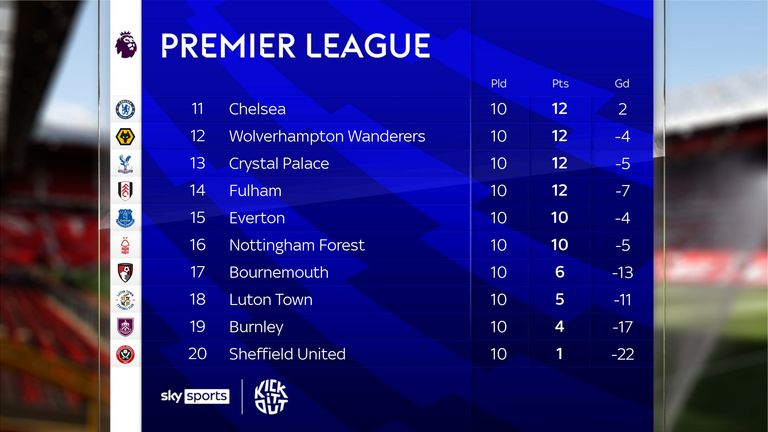Luton host Liverpool on Sky Sports | What do promoted Premier League teams need most to survive?
Sheffield United would finish season on record-low four points if form continues; Burnley have youngest side; Luton outperforming fellow promoted sides; watch Luton vs Liverpool live on Sky Sports Premier League on Sunday from 4pm; kick-off 4.30pm

Monday 4 December 2023 12:33, UK
All three promoted teams survived last season: Fulham, Bournemouth and Nottingham Forest - but the top-flight newbies are struggling this term.
Sheffield United are propping up the table with just one point from 10 games, while Burnley and Luton are also languishing in the relegation zone.
Rob Edwards' men host Liverpool in front of the Sky cameras on Sunday afternoon with a chance to achieve a giant-killing and jump clear of the drop zone - but what do promoted sides typically need to secure survival?
Here, we run through the following factors to reveal what's required to avoid an immediate return to the Championship.
- The best and worst promoted teams since 1995/96
- Has it got tougher for promoted teams to survive?
- Does promotion route hold clues to survival chances?
- Does transfer spending improve chances?
- Is attack or defence more important?
- How important is home form?
- Does sacking the manager produce a bounce?
- Does experience help?
- How the current promoted teams fare
- Opta's predicted final league table
The best and worst promoted teams
Ipswich were favourites for relegation at the start of the 2000/01 season after winning promotion via the play-offs, but finished in a remarkable fifth place, qualifying for the UEFA Cup and earning 66 points - merely one point shy of Liverpool's tally last season.
Derby County hold the unfortunate record of having the worst top-flight campaign since the current points system was introduced. The Rams collected just 11 points in 2007/08 after their promotion in 2007 and won only one game.
Tougher these days?
Since 1995/96, 36 of the 83 promoted teams have been relegated immediately - equating to a 57-per-cent survival rate.
With the strength of the traditional 'Big Six' and an established chasing group, all clubs at the bottom of the table have increasingly struggled to pick up points over the past 28 seasons.
As a result, the average number of points required to secure safety had dropped to just over 34 between 2016 and 2023 - down from closer to 38 between 1995 and 2002.
Does requiring fewer points help promoted teams survive? Well, Fulham, Bournemouth and Nottingham Forest all avoided the drop last term - the first time all three promoted clubs have survived since 2017/18.
The five-year rolling average for promoted clubs' survival rates suggests, currently, teams typically have a 50/50 chance of staying up.
Does promotion route hold clues to survival chances?
Unsurprisingly, Championship winners have the best survival rates with 64.3 per cent of champions proceeding to preserve their top-flight status for a second season running.
However, play-off winners (59.3 per cent) have had more success than runners-up (46.4 per cent) over the past 28 years.
Does spending secure survival?
Fulham splashed more than £100m on transfers to no avail in 2018/19, but large injections of cash have, historically, appeared to keep clubs up. In total, 22 clubs have recorded a net spend of £30m or more on transfers after winning promotion - only five of those were relegated (relegated clubs marked in red below).
Last season, Nottingham Forest registered a £173.25m net spend on transfers to successfully avoid the drop - more than any promoted side in history.
So clubs can buy success, but wise investment is key.
Attack or defence?
The graphic below shows how many goals every newly-promoted team scored and conceded during a season since 1995/96 and reveals their fate hinged far more on defensive robustness than attacking edge.
The majority of relegated sides conceded in excess of 60 goals, while a high proportion of teams that survived shipped totals below this threshold.
Newly-promoted teams typically score around 40 goals, regardless of whether they stay up - but the majority of teams that survive concede around 58 goals, compared with 66 for relegated sides. So, defence is key.
Home form key?
A classic case of utilising home advantage was Burnley in 2016/17, who mustered 33 points at Turf Moor but collected merely seven points on the road - and there are plenty more examples.
So, is home form essential for survival? The graphic below shows how every newly-promoted side winning at least 21 home points and just 14 away points has survived. So, home form does matter.
The bounce effect?
In total, 23 out of 83 promoted clubs have axed or lost their manager in the season after promotion - typically during the frantic festive schedule or towards the business end - but did those manager changes achieve the sought-after bounce effect?
Well, only seven of those 23 clubs stayed up after sacking their manager.
Those seven sides averaged just 0.34 points per game more after bringing in a new boss - but the swings in form can be significant.
Crystal Palace's form soared after sacking Ian Holloway in October 2013, with the Eagles going on to stay up - but Watford suffered a major dip after axing Xisco in October 2021 and were relegated.
Experience pivotal?
Experience is often considered an essential ingredient for survival, but our study reveals only a slight correlation between experience and survival.
Teams with average starting XIs aged between 25 and 26 fare worst with only a 40 per cent survival rate, but that ratio rises almost incrementally, with teams averaging at 29 years or older having the highest success rate of 66.7 per cent - albeit from a smaller sample size.
The current teams
In terms of Sheffield United, two out of five teams have survived with one point after eight games in Premier League history: Southampton in 1998/99 and Sunderland in 2013/14. So hope is not lost, yet.
For Burnley and Luton, 18 out of 42 teams have survived relegation with four or fewer points from their first eight games, which equates to a 43-per-cent chance of survival.
So, do the factors above provide clues for the promoted teams?
Sheffield United
- Promotion route: Runners-up
- Projected points: 4
- Projected home points: 4
- Projected away points: 0
- Projected goals scored: 27
- Projected goals conceded: 110
- Average age: 26y 267d
- Net spend on transfers: £34.2m
The projections above are based on Sheffield United maintaining their current, torrid form throughout the remainder of this campaign. Paul Heckingbottom's side have collected merely one point from 10 games and would finish the season on an all-time low of just four points come May - if that form continues.
Looking deeper into the numbers, the 8-0 hammering against Newcastle might have skewed their defensive record, but extra defensive robustness is certainly required, while a slight boost in front of goal would help their cause.
A reasonable level of transfer investment this summer has, arguably, merely compensated for losing key players Iliman Ndiaye and Sander Berge, while the track record of teams promoted as runners-up could bite them.
Burnley
- Promotion route: Champions
- Projected points: 15
- Projected home points: 0
- Projected away points: 15
- Projected goals scored: 30
- Projected goals conceded: 95
- Average age: 24y 170d
- Net spend on transfers: £46.6m
Burnley are yet to pick up a single point at Turf Moor and that will certainly need to change if Vincent Kompany's men are to retain top-flight status this term - a far cry from Sean Dyche's fortress in 2016/17.
The Clarets also need to tighten up at the back, but their £46.6m splurge on signings boosts their chances come May - as does their passageway to the Premier League as Championship winners last term. Experience could prove a problem, with the team currently registering as the youngest in the division at just 24 years and 170 days.
Luton
- Promotion route: Play-offs
- Projected points: 19
- Projected home points: 4
- Projected away points: 15
- Projected goals scored: 34
- Projected goals conceded: 76
- Average age: 26y 355d
- Net spend on transfers: £9.5m
On paper, Luton have been the most successful of the three promoted teams so far. The numbers suggest slight boosts at both ends of the pitch are required but minimal investment on transfers could hinder their hopes of survival.
Conclusion
According to Opta's 'Expected Points' model - which is based on expected goals - Luton should be four points better off right now and would rise one notable spot out of the drop zone, at the expense of Bournemouth.
However, Opta's supercomputer predicts Luton will succumb and suffer relegation come May, along with Sheffield United and Burnley.
For Luton, a win against Liverpool at Kenilworth Road would be a monumental scalp.
The average promoted side escaping relegation should have collected around nine points by this stage of the season. However, the bar could be lowered this term with all promoted sides and Bournemouth struggling to pick up points - as a four-horse race to secure survival begins to take shape.









